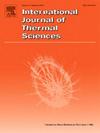基于cfd深度学习模型的电动汽车充电连接器温度预测方法
IF 4.9
2区 工程技术
Q1 ENGINEERING, MECHANICAL
International Journal of Thermal Sciences
Pub Date : 2025-07-07
DOI:10.1016/j.ijthermalsci.2025.110139
引用次数: 0
摘要
旨在快速预测动态环境下电动汽车充电连接器的温度,阐明充电过程中各参数影响温度特性的机理。首先通过实验验证了计算流体力学(CFD)模拟的可靠性。随后,对接触电阻、环境温度、充电电流对充电器内部温度分布的影响进行了系统的CFD分析。此外,提出了一种新的数据驱动方法,利用改进的麻雀搜索算法(ISSA)优化长短期记忆(LSTM)神经网络进行实时温度预测。该方法通过超参数优化提高了预测性能。结果表明,该模型具有较高的计算精度,最大误差为7.53%。CFD分析明确了各参数对充电器温升的影响。此外,所提出的优化策略显著提高了模型性能,与传统LSTM模型相比,ISSA-LSTM模型的平均绝对误差降低了50%。该模型还显示出较强的泛化能力,在超出训练数据范围的测试用例中,最大绝对误差保持在5°C以内。该方法为电动汽车充电系统的温度预测提供了有效可靠的工具,具有较大的工业应用潜力。本文章由计算机程序翻译,如有差异,请以英文原文为准。
A temperature prediction method for electric vehicle charging connectors using a CFD-based deep learning model
Aiming to rapidly predict the temperature of electric vehicle (EV) charging connectors in dynamic environments and clarify the mechanisms by which various parameters affect temperature characteristics during the charging process. The reliability of the computational fluid dynamics (CFD) simulation was first validated through experiments. Subsequently, a systematic CFD analysis was conducted to investigate the effects of contact resistance, ambient temperature, and charging current on the internal temperature distribution of the charger. Additionally, a novel data-driven approach was proposed, utilizing an improved sparrow search algorithm (ISSA) to optimize a long short-term memory (LSTM) neural network for real-time temperature prediction. This approach enhances predictive performance through hyperparameter optimization. The results show that the CFD model has high accuracy, with a maximum error of 7.53 %. CFD analysis clarified the effects of various parameters on the charger's temperature rise. Furthermore, the proposed optimization strategy significantly improved model performance, with the ISSA-LSTM model achieving a 50 % reduction in mean absolute error compared to the conventional LSTM model. The model also demonstrated strong generalization capability, with the maximum absolute error remaining within 5 °C in test cases beyond the training data range. This method provides an effective and reliable tool for temperature prediction in EV charging systems, with considerable industrial application potential.
求助全文
通过发布文献求助,成功后即可免费获取论文全文。
去求助
来源期刊

International Journal of Thermal Sciences
工程技术-工程:机械
CiteScore
8.10
自引率
11.10%
发文量
531
审稿时长
55 days
期刊介绍:
The International Journal of Thermal Sciences is a journal devoted to the publication of fundamental studies on the physics of transfer processes in general, with an emphasis on thermal aspects and also applied research on various processes, energy systems and the environment. Articles are published in English and French, and are subject to peer review.
The fundamental subjects considered within the scope of the journal are:
* Heat and relevant mass transfer at all scales (nano, micro and macro) and in all types of material (heterogeneous, composites, biological,...) and fluid flow
* Forced, natural or mixed convection in reactive or non-reactive media
* Single or multi–phase fluid flow with or without phase change
* Near–and far–field radiative heat transfer
* Combined modes of heat transfer in complex systems (for example, plasmas, biological, geological,...)
* Multiscale modelling
The applied research topics include:
* Heat exchangers, heat pipes, cooling processes
* Transport phenomena taking place in industrial processes (chemical, food and agricultural, metallurgical, space and aeronautical, automobile industries)
* Nano–and micro–technology for energy, space, biosystems and devices
* Heat transport analysis in advanced systems
* Impact of energy–related processes on environment, and emerging energy systems
The study of thermophysical properties of materials and fluids, thermal measurement techniques, inverse methods, and the developments of experimental methods are within the scope of the International Journal of Thermal Sciences which also covers the modelling, and numerical methods applied to thermal transfer.
 求助内容:
求助内容: 应助结果提醒方式:
应助结果提醒方式:


